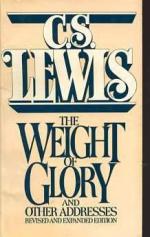
|
| Name: _________________________ | Period: ___________________ |
This test consists of 15 multiple choice questions and 5 short answer questions.
Multiple Choice Questions
1. In "Membership", Lewis says that _________ has replaced friendship.
(a) Solitude.
(b) Society.
(c) Caucus.
(d) Acquaintance.
2. Lewis says, when discussing forgiveness, that very often when praying he finds that he has asked God not to forgive him, but for what?
(a) To make life easier.
(b) To grant some wish.
(c) To punish others.
(d) To excuse him.
3. In "Is Theology Poetry?" what writer does Lewis reference when talking about the Scientific Outlook?
(a) Robert A. Heinlein.
(b) H.G. Wells.
(c) George Orwell.
(d) J.R.R. Tolkien.
4. In "Membership", Lewis says that the modern notion that children should call their parents by their Christian names is what?
(a) Perverse.
(b) Necessary.
(c) Logical.
(d) Obnoxious.
5. "Is Theology Poetry?" states that while some divine illumination is given to all men, which group has received special illumination?
(a) Christians.
(b) Muslims.
(c) Buddhists.
(d) Catholics.
6. In "Is Theology Poetry?" what mythological person does Lewis say has a far more heroic appeal than the Christian God?
(a) Zeus.
(b) Jupiter.
(c) Anu.
(d) Odin.
7. Though Lewis says in "On Forgiveness" that we should forgive someone who breaks a promise, he also says what?
(a) We should never speak to the person again.
(b) We should pretend the promise was never made.
(c) We should believe the next promise.
(d) We don't have to believe the next promise.
8. In the opening of "On Forgiveness", Lewis says what about believing in the forgiveness of sins?
(a) It is not as easy as he thought.
(b) It is easier than he thought.
(c) It is essential to the Christian faith.
(d) It is irrelevant to the Christian faith.
9. Lewis says in "The Inner Ring" that an egoist is all but which of the following?
(a) Rude.
(b) Unscrupulous.
(c) Treacherous.
(d) Ruthless.
10. Lewis says in "Membership" that he does not believe God created what kind of world?
(a) Democratic.
(b) Communist.
(c) Egalitarian.
(d) Republican.
11. With what famous author does Lewis begin "The Inner Ring"?
(a) Tolstoi.
(b) Bacon.
(c) Wordsworth.
(d) Shelley.
12. Lewis says, in "The Inner Ring", that in the next ten years his audience will be busy doing all but which of the following?
(a) Getting married.
(b) Finding jobs.
(c) Acquiring facts.
(d) Bringing peace to Europe.
13. In "Is Theology Poetry?" how does Lewis define theology?
(a) Analysis of God.
(b) Series of statements about God.
(c) Study of religious truth.
(d) Study of God's relation to the universe.
14. In "Is Theology Poetry?" Lewis says that Europe took a major interest in classical mythology during which periods?
(a) 4th to 9th centuries.
(b) 10th to 15th centuries.
(c) 12th to 17th centuries.
(d) 19th to 21st centuries.
15. In "Is Theology Poetry?" Lewis states that when you reach the New Testament truth is incarnate, and in this, "incarnate" is more than just what?
(a) Metaphor.
(b) Hyperbole.
(c) Analogy.
(d) Symbolism.
Short Answer Questions
1. In "The Inner Ring", Lewis says that the quest for the ring will break what?
2. According to "On Forgiveness", it is a safe bet in regard to the sins of others that the excuses are what?
3. "Membership" states that unity is the road to what?
4. In his discussion of what it takes to be a member of the inner ring, Lewis says that the trial for the inner ring may end in all but which of the following ways?
5. According to Lewis in "On Forgiveness", excusing that which produces a really good excuse is not charity but what?
|
This section contains 549 words (approx. 2 pages at 300 words per page) |

|




